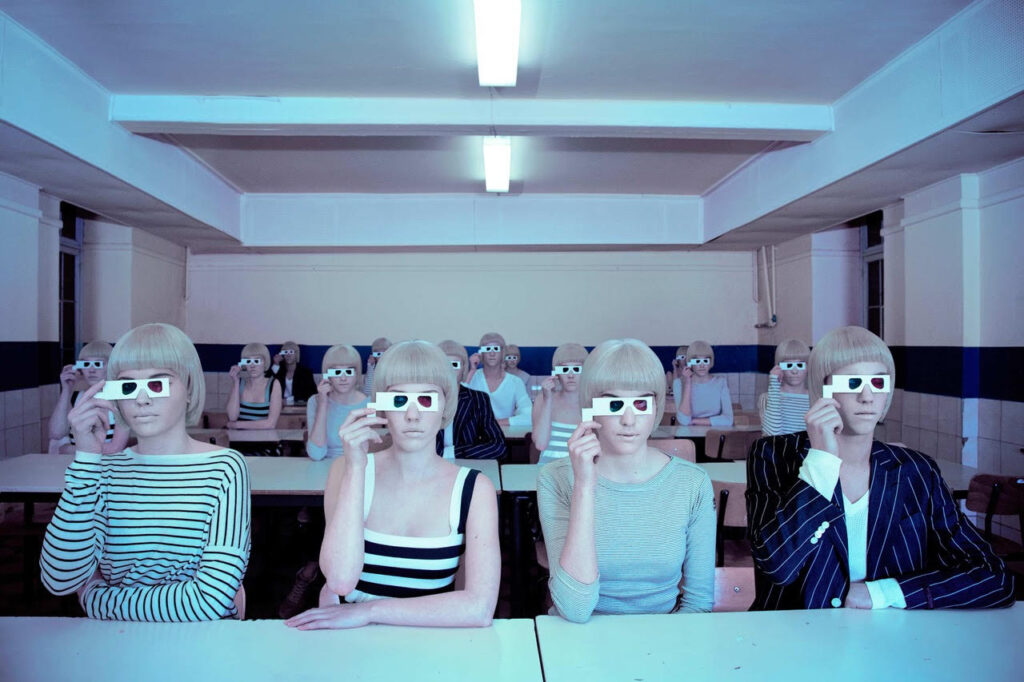Her visual references come from cinema, while her research is focused on the concept of identity. In particular, it is the feminine sphere that is most investigated. But not only that. Lisa Carletta‘s photographs range from collaborations with brands to more personal works, from which her unsettling, sometimes anxiety-inducing, but always hyper-saturated vision of the world emerges. Carletta is primarily known as a fashion photographer, although she doesn’t like to be categorized as such. «For a long time, I presented myself as a fashion photographer, with magazines being my main medium, even though I knew my work was somewhat different from that of other fashion photographers,» explains Lisa, whom we met to hear some behind-the-scenes stories of her work and some reasons behind her stylistic choices. Was it precisely the world of fashion, with its standards and idealized models to look up to and aspire to, that led her to reflect on the theme?


Let’s talk about your path. How did you approach photography?
Lisa Carletta: I have an uncommon path. I started by studying advertising and was destined to be an art director. I went through big advertising agencies, where I immersed myself in the world of advertising. There I realized that the only thing I was interested in was working on the visual side. During each project I looked forward to meeting the photographers we chose to shoot our ideas. Also during that time I started experimenting and made a few photo series. It all really started when I participated in a fashion photo contest, came third and they started to notice me. From there I started working for fashion magazines between Brussels and Paris.


Your shots have a very cinematic edge, the sphere within which they are enclosed looks to the past and to fashion photography. Everything, however, is shrouded in a dramatic aura, and in some shots the attention you pay to the theme of identity and, more generally, to generational issues is evident. What is your intention? What are you looking for in your shots?
Lisa Carletta: I have always been very influenced by cinema – especially the movies I watched as a child – and the big Hollywood studios. All scenarios that always made me dream and suggested a reality that was not my own. I think my interest in color and its study stems mainly from there. It is also a way to contrast the more ‘dramatic’ side of the subjects I photograph.


I have directed my interests toward exploring the position of the body in society, particularly women’s bodies and the perception of beauty. I have worked on the conception of beauty and its authenticity, how we try to correspond to an ideal distorted by the media, and how this can affect our identities and the way we represent ourselves. Consequently, in my fashion series, I have worked a lot on ‘loss of identity,’ on standardization.
In most of your shots the subjects never look into the lens. Especially when the scenes are collective, the feeling of indifference is noticeable. Does this choice have a meaning?
Lisa Carletta: Actually, I rarely make my models look into the lens because I imagine myself as a little mouse observing a scene, a movie scene unfolding before my eyes. The characters live their lives, continue the activities of their daily routine, without my presence interfering in any way. I think this perceived feeling of indifference reflects our increasingly individualistic society, where we are focused only on ourselves, our thoughts, our problems.


In some shots the subjects wear white masks. What do you want to communicate?
Lisa Carletta: These are the masks from the Golden Cage series, they are “beauty” masks that are meant to rejuvenate. Of course, I also chose this mask because of its aesthetic, which is very similar to that used in some horror films, such as Michael Myers’ mask in Friday the 13th or the one in Georges Franju’s Les Yeux sans visage. The use of the mask is always linked to these themes of the cult of beauty, the search for ideals of beauty, the quest for perfection-sometimes inaccessible-and the desire to conform at any cost.






















Courtesy & Copyright Lisa Carletta
